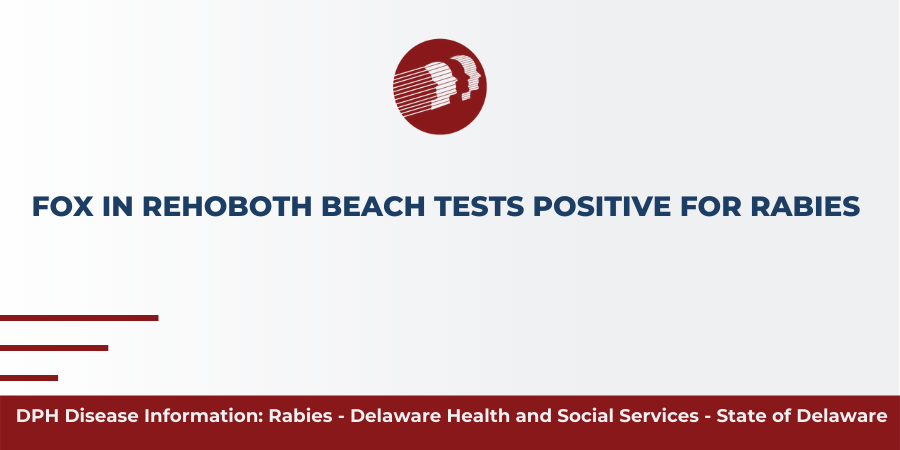Fox in Rehoboth Beach Tests Positive for Rabies
Division of Public Health | Date Posted: Saturday, March 19, 2022
Division of Public Health | Date Posted: Saturday, March 19, 2022

DOVER (March 18, 2021) – The Delaware Division of Public Health (DPH) is advising Sussex County residents, who live or spend time near the area of Bayard Avenue and Philadelphia Street in Rehoboth Beach, of a positive case of rabies in a fox. One individual, a non-Delaware resident, was potentially exposed to the fox in the residential neighborhood. The fox was tested for rabies, which returned positive results on Friday, March 18, 2022. The individual has been contacted to begin post-exposure prophylaxis treatment (PEP).
Since Jan. 1, 2022, the Division of Public Health has performed rabies tests on 46 animals, two of which were confirmed to be rabid, which includes one raccoon and one fox, including this positive animal. DPH only announces those rabies cases for which it is possible the animal had unknown contacts with additional humans or pets. In 2021, DPH performed rabies tests on 188 animals, 19 of which were confirmed to be rabid, which includes one dog, one deer, one fox, one cow, two skunks, three cats, four raccoons and six bats.
Anyone who thinks they might have been bitten, scratched, or encountered a fox in this area should immediately contact their health care provider or call the DPH Rabies Program at 302-744-4995. An epidemiologist is available 24/7. Anyone in the area who thinks a fox may have bitten their pet should call their private veterinarian to have their pet examined and treated, and the exposure reported to the Delaware Department of Agriculture.
Rabies is a preventable disease. DPH recommends that individuals take the following steps to prevent rabies exposure:
If You Encounter an Animal Behaving Aggressively:
If You Encounter a Sick or Injured Animal:
For more information on the DPH rabies program, visit www.dhss.delaware.gov/dhss/dph/dpc/rabies.html or call 1-866-972-9705 or 302-744-4995. For more information on rabies, visit the Centers for Disease Control and Prevention at www.cdc.gov/rabies/.
# # #
Anyone who is deaf, hard of hearing, Deaf-Blind or speech disabled can contact DPH by dialing 711 first using specialized devices (i.e. TTY, TeleBraille, voice devices). The 711 service is free and to learn more about how it works, please visit delawarerelay.com. Delaware Health and Social Services is committed to improving the quality of the lives of Delaware’s citizens by promoting health and well-being, fostering self-sufficiency, and protecting vulnerable populations.
Keep up to date by receiving a daily digest email, around noon, of current news release posts from state agencies on news.delaware.gov.
Here you can subscribe to future news updates.
Division of Public Health | Date Posted: Saturday, March 19, 2022

DOVER (March 18, 2021) – The Delaware Division of Public Health (DPH) is advising Sussex County residents, who live or spend time near the area of Bayard Avenue and Philadelphia Street in Rehoboth Beach, of a positive case of rabies in a fox. One individual, a non-Delaware resident, was potentially exposed to the fox in the residential neighborhood. The fox was tested for rabies, which returned positive results on Friday, March 18, 2022. The individual has been contacted to begin post-exposure prophylaxis treatment (PEP).
Since Jan. 1, 2022, the Division of Public Health has performed rabies tests on 46 animals, two of which were confirmed to be rabid, which includes one raccoon and one fox, including this positive animal. DPH only announces those rabies cases for which it is possible the animal had unknown contacts with additional humans or pets. In 2021, DPH performed rabies tests on 188 animals, 19 of which were confirmed to be rabid, which includes one dog, one deer, one fox, one cow, two skunks, three cats, four raccoons and six bats.
Anyone who thinks they might have been bitten, scratched, or encountered a fox in this area should immediately contact their health care provider or call the DPH Rabies Program at 302-744-4995. An epidemiologist is available 24/7. Anyone in the area who thinks a fox may have bitten their pet should call their private veterinarian to have their pet examined and treated, and the exposure reported to the Delaware Department of Agriculture.
Rabies is a preventable disease. DPH recommends that individuals take the following steps to prevent rabies exposure:
If You Encounter an Animal Behaving Aggressively:
If You Encounter a Sick or Injured Animal:
For more information on the DPH rabies program, visit www.dhss.delaware.gov/dhss/dph/dpc/rabies.html or call 1-866-972-9705 or 302-744-4995. For more information on rabies, visit the Centers for Disease Control and Prevention at www.cdc.gov/rabies/.
# # #
Anyone who is deaf, hard of hearing, Deaf-Blind or speech disabled can contact DPH by dialing 711 first using specialized devices (i.e. TTY, TeleBraille, voice devices). The 711 service is free and to learn more about how it works, please visit delawarerelay.com. Delaware Health and Social Services is committed to improving the quality of the lives of Delaware’s citizens by promoting health and well-being, fostering self-sufficiency, and protecting vulnerable populations.
Keep up to date by receiving a daily digest email, around noon, of current news release posts from state agencies on news.delaware.gov.
Here you can subscribe to future news updates.